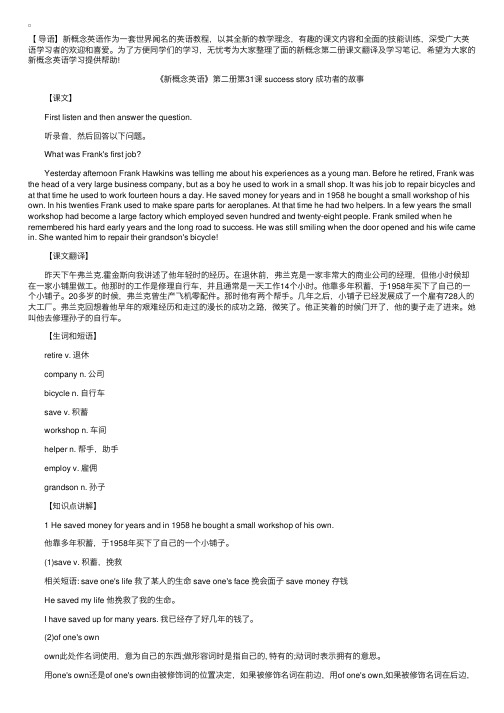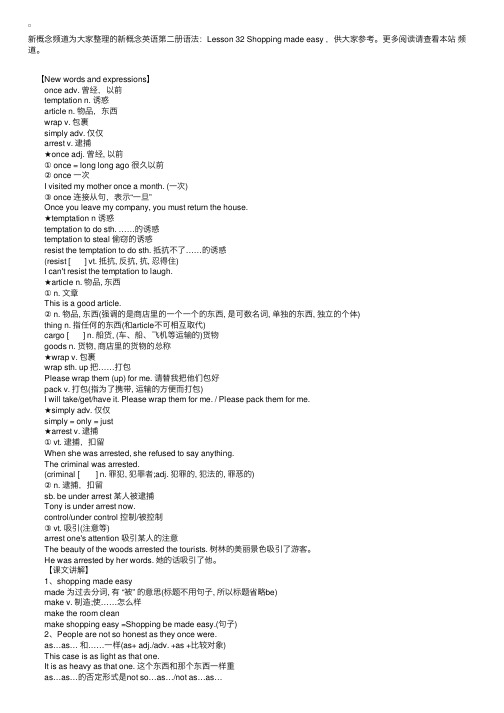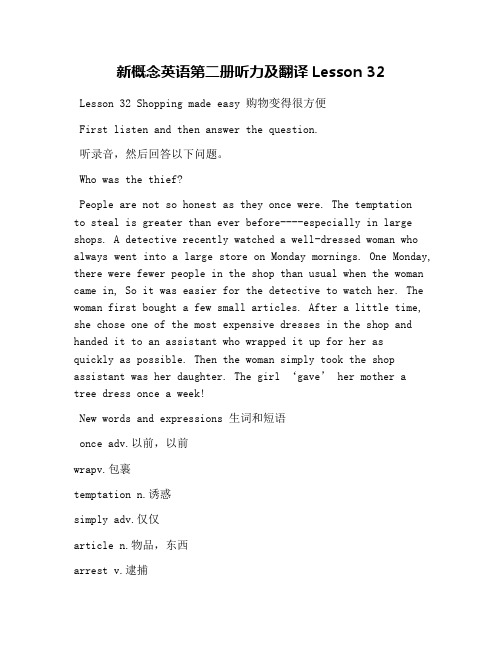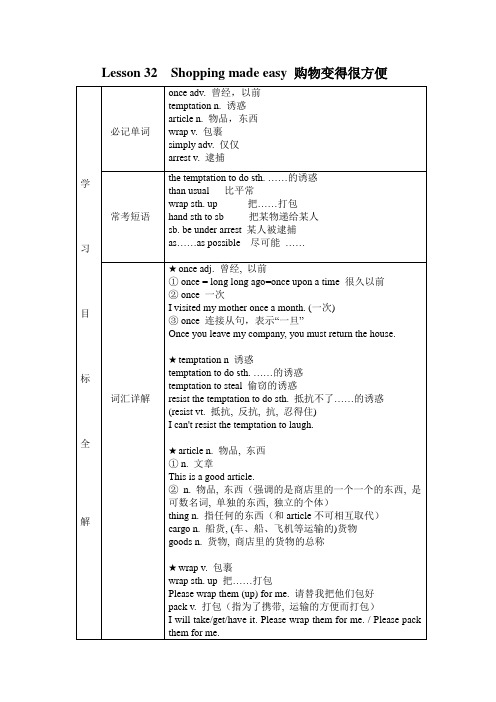新概念英语第二册课后答案详解lesson32
新概念2册练习册 Lesson 32 Homework 教师版

●用as…as连接句子。
Example:a) Her sister isn’t pretty. She says she’s pretty.Her sister isn’t as pretty as she says.b) The film was frightening. He said it was frightening.The film was as frightening as he said.1. The hotel was modern. The hotel we stayed at in California was modern. The hotel was as modern as the hotel we stayed at in California.2. The beach is crowded. It usually is crowded in Cuba.The beach is as crowded as it usually is in Cuba.3. The hotel waiters were helpful. They are helpful in Sydney.The hotel waiters were as helpful as they are in Sydney.4. The sea was cold. It is cold in Europe.The sea was as cold as it is in Europe.5. He made many friends. He usually makes many friends at home.He made as many friends as he usually does at home.6. She isn’t nice. She seems to be nice.He isn’t as nice as she seems to be.7. He hasn’t got much work to do. I have a lot of work to do.He hasn’t got as much work to do as I have.●仿照例句改写下列句子。
新概念第二册课文翻译及学习笔记【Lesson31、32、33】

【导语】新概念英语作为⼀套世界闻名的英语教程,以其全新的教学理念,有趣的课⽂内容和全⾯的技能训练,深受⼴⼤英语学习者的欢迎和喜爱。
为了⽅便同学们的学习,⽆忧考为⼤家整理了⾯的新概念第⼆册课⽂翻译及学习笔记,希望为⼤家的新概念英语学习提供帮助!《新概念英语》第⼆册第31课 success story 成功者的故事【课⽂】First listen and then answer the question.听录⾳,然后回答以下问题。
What was Frank's first job?Yesterday afternoon Frank Hawkins was telling me about his experiences as a young man. Before he retired, Frank was the head of a very large business company, but as a boy he used to work in a small shop. It was his job to repair bicycles and at that time he used to work fourteen hours a day. He saved money for years and in 1958 he bought a small workshop of his own. In his twenties Frank used to make spare parts for aeroplanes. At that time he had two helpers. In a few years the small workshop had become a large factory which employed seven hundred and twenty-eight people. Frank smiled when he remembered his hard early years and the long road to success. He was still smiling when the door opened and his wife came in. She wanted him to repair their grandson's bicycle!【课⽂翻译】昨天下午弗兰克.霍⾦斯向我讲述了他年轻时的经历。
新概念英语第二册语法:Lesson32Shoppingmadeeasy

He went home as soon as possible.
7、When she was arrested, the detective found out that the shop assistant was her daughter.
find out 发现……(后跟的宾语一般是抽象的)
新概念频道为大家整理的新概念英语第二册语法:Lesson 32 Shopping made easy ,供大家参考。更多阅读请查看本站 频 道。
【New words and expressions】 once adv. 曾经,以前 temptation n. 诱惑 article n. 物品,东西 wrap v. 包裹 simply adv. 仅仅 arrest v. 逮捕 ★once adj. 曾经, 以前 ① once = long long ago 很久以前 ② once 一次 I visited my mother once a month. (一次) ③ once 连接从句,表示“一旦” Once you leave my company, you must return the house. ★temptation n 诱惑 temptation to do sth. ……的诱惑 temptation to steal 偷窃的诱惑 resist the temptation to do sth. 抵抗不了……的诱惑 (resist [ ] vt. 抵抗, 反抗, 抗, 忍得住) I can't resist the temptation to laugh. ★article n. 物品, 东西 ① n. 文章 This is a good article. ② n. 物品, 东西(强调的是商店里的一个一个的东西, 是可数名词, 单独的东西, 独立的个体) thing n. 指任何的东西(和article不可相互取代) cargo [ ] n. 船货, (车、船、飞机等运输的)货物 goods n. 货物, 商店里的货物的总称 ★wrap v. 包裹 wrap sth. up 把……打包 Please wrap them (up) for me. 请替我把他们包好 pack v. 打包(指为了携带, 运输的方便而打包) I will take/get/have it. Please wrap them for me. / Please pack them for me. ★simply adv. 仅仅 simply = only = just ★arrest v. 逮捕 ① vt. 逮捕,扣留 When she was arrested, she refused to say anything. The criminal was arrested. (criminal [ ] n. 罪犯, 犯罪者;adj. 犯罪的, 犯法的, 罪恶的) ② n. 逮捕,扣留 sb. be under arrest 某人被逮捕 Tony is under arrest now. control/under control 控制/被控制 ③ vt. 吸引(注意等) arrest one's attention 吸引某人的注意 The beauty of the woods arrested the tourists. 树林的美丽景色吸引了游客。 He was arrested by her words. 她的话吸引了他。 【课文讲解】
新概念英语第二册课后答案参考

新概念英语第二册课后答案参考 Lesson 1. 1.(b) 2.(c) 3.(b) 4.(d) 5.(c) 6.(a) 7.(d) 8.(b) 9..a) 10.(c) 11.(c) 12.(c)Lesson 2. 1.(c.) 2.(d) 3.(c) 4.(c) 5.(a) 6.(b) 7.(b) 8.(a) 9.(d) 10.(c) 1 1.(d) 12.(b)Lesson 3. 1.(c) 2.(a) 3.(c) 4.(a) 5.(d) 6.(b) 7.(c) 8.(c) 9.(b) 10.(a) 11.(b) 12.(b)Lesson 4. l.(d) 2.(b) 3.(a) 4.(b) 5.(b) 6.(a) 1.(c) 8.(b) 9.(c) 10.(a) 1 1.(c) 12.(c)Lesson 5. l.(c) 2.(a) 3.(d) 4.(b) 5.(c) 6.(d)-.(a) 8.(h) 9.(c) lO.fb) ll.(a) 12.(-d)Lesson 6. l.(d) 2.(a) 3.(c) 4.(d) 5.(d) 6.(a) 7.(d) 8.(a) 9.(b) lO.(a) 1 1.(d, 12.(a)Lesson 7. l.(b) 2.(c) 3.(c) 4.(d) 5.(a) 6.(c) 7.(d) 8.(a) 9.(c) 10.(b) 1 1.(a) 12.(b)Lesson 8. l.(d) 2.(b) 3.(b) 4.(a) 5.(c) 6.(c) 7.(b) 8.(b) 9.(a) 10.(d) 1 1.(b) 12.(b)Lesson 9. 1 .(b) 2.(b) 3.(d) 4.^a) 5.(a) 6.(b.) 7.(b) 8.(d) 9.(b) 10.(b) 11 .(d) 12.(c)Lesson10. l.(a.) 2.(d) 3.(d) 4.(c) 5.(b) 6.fc) 7.(a) 8.(c) 9.(a) 10.(c) 1 1.(c) 12.(a)Lesson11. l.(b) 2.(b) 3.(b) 4.(a) 5.(b) 6.(c) 7.(c) 8.(a) 9.(c) 10.(c) 1 1.(b) 12.(d)Lesson12. l.(c) 2.(c) 3.(a) 4.(d) 5.(d) 6.(a) 7.(d) 8.(a) 9.(c) 10.(d) 1 1.(a) 12.(a)Lesson13. l.(b)2.(d) 3.(b) 4.(c) 5.(a) 6.(b) 7.(b) 8.(c)9.(a) 10.(a) ll.(a) 12.(d)Lesson14. 1.(b)2.(c) 3.(a) 4.(c) 5.(d) 6.(b) 7.(c) 8.(b) 9.(c) 10.(b) 11.(b) 12.(b)Lesson15. l.(d) 2.(b) 3.(c)4.(b) 5.(c) 6.(d) 7.(a) 8.(d) 9.(c) 10.(c) ll.(c) 12.(b)Lesson16. l.(a) 2.(a) 3.('d?4.(a) 5.(b) 6.(a) 7.(d) 8.(a) 9.(d) 10.(d) 1 1.(d) 12.(a)Lesson17.1.(d) 2.(b) 3.(b) 4.(d) 5.(c) 6.(c) 7.(b) 8.(a) 9.(a) 10.(c) 11.(a) 12.(d)Lesson18. l.(b) 2.(d) 3.(b) 4.(d) 5.(b) 6.(c) 7.(d) 8.(c) 9.(a) 10.(c) 11.(c) 12.(b)Lesson19. l.(a) 2.(d) 3.(c) 4.(c) 5.(d) 6.(b) 7.(c) 8.(b) 9.(c) 10.(a) 11.(c) 12.(c)Lesson20. l.(b) 2.(c) 3.(b) 4.(b) 5.(c) 6.(b) 7.(c) 8.(a) 9.(c) 10.(c) 11.(d) 12.(a)Lesson21. l.(c) 2.(d) 3.(c) 4.(d) 5.(a) 6.(c) 7.(b) 8.(b) 9.(a) 10.(d) 11.(c) 12.(c)Lesson22. l.(d) 2.(b) 3.(d) 4.(d) 5.(b) 6.(d) 7.(a) 8.(c) 9.(d) 10.(a) ll.(b) 12.(b)Lesson 23. l.(a) 2.(a) 3.(a) 4.( c) 5.(c) 6.(a) 7.(d) 8.(d) 9.(b) 10.(b) 1 l.(a) 12.(d)Lesson 24. l.(b) 2.(a)3.(a) 4.(c) 5.(a) 6.(a) 7.(c) 8.(c) 9.(c) 10.(b) 11.(a) 12.(b)Lesson 25. l.(c) 2.(b) 3.(b) 4.(a) 5.(b) 6.(c) 7.(d) 8.(b) 9.(a) 10.(a) 1 l.(d) 12.(a)Lesson 26. 1 .(a) 2.(d) 3.(c) 4.(b) 5.(c) 6.(d) 7.(d) 8.(a) 9.(b) 10.(d) 1 ] .(b) 12.(d)Lesson27. l.(d) 2.(c) 3.(d)4.(d) 5.(d) 6.(b) 7.(a) 8.(d) 9.(d) 10.(c) ll.(c) 12.(c)Lesson 28. l.(c) 2.(d) 3.(b) 4.(b) 5.(c) 6.(d) 7.(b) 8.(d) 9.(c) ]0.(d) 1 l.(b) 12.(a)Lesson29. l.(b) 2.(c) 3.(c)4.(b) 5.(d) 6.(b) 7.(a) 8.(b) 9.(b) 10.(b) ll.(c) 12.(b)Lesson 30. l.(a) 2.(a) 3.(d) 4.(a) 5.(b) 6.(c) 7.(c) 8.(c) 9.(d) 10.(a) 11.(d) 12.(d)Lesson 31. l.(d) 2.(b) 3.(a) 4.(c) 5.(a) 6.(a) 7.(d) 8.(a) 9.(b) 10.(c) 1 l.(a) 12.(c)Lesson 32. l.(c) 2.(c) 3.(c) 4.(b) 5.(b) 6.(c) 7.(a) 8.(d) 9.(a) 10.(d) 11.(b) 12.(c)Lesson 33. l.(d)2.(b)3.(d)4.(a)5.(c)6.(b) 7.(b)8.(c) 9.(c) 10.(c) 11.(a) 12.(c)Lesson 34. l.(d) 2.(a) 3.(b) 4.(c) 5.(a) 6.(d) 7.(c) 8.(b) 9.(c) 10.(b) 11.(c) 12.(a)Lesson 35. l.(a) 2.(d) 3.(a) 4.(d) 5.(d) 6.(a) 7.(d) 8.(a) 9.(b) ]0.(a) 11.(d) 12.(d)Lesson 36. l.(a)2.(d) 3.(d)4.(c)5.(d)6.(c) 7.(c) 8.(b)9.(a) 10.(d) 11.(c) 12.(c)Lesson 37. l.(c) 2.(b) 3.(b) 4.(b) 5.(b) 6.(d) 7.(a) 8.(c) 9.(d) 10.(b) 1 l.(b) 12.(a)Lesson 38. l.(b) 2.(c) 3.(a) 4.(a) 5.(c) 6.(b) 7.(d) 8.(d) 9.(b) 10.(a) 1 l.(d) 12.(d)Lesson 39. l.(d) 2.(a) 3.(c)4.(d) 5.(d) 6.(a) 7.(b) 8.(a) 9.(c) 10.(c) ll.(a) 12.(b)Lesson 40. l.(c) 2.(c) 3.(b) 4.(c) 5.(a) 6.(a) 7.(c) 8.(b) 9.(b) 10.(b) 11.(b) 12.(d)Lesson41. l.(a) 2.(a) 3.(c)4.(d) 5.(c) 6.(b) 7.(b) 8.(a) 9.(d) 10.(a) ll.(c) 12.(b)Lesson 42. l.(d)2.(d) 3.(d) 4.(b) 5.(b) 6.(c) 7.(d) 8.(d) 9.(a) 10.(c) 11.(d) 12.(a)Lesson43. l.(b)2.(b) 3.(a) 4.(a) 5.(d) 6.(d) 7.(a) 8.(c) 9.(c) 10.(d) ll.(a) 12.(c)Lesson 44. l.(c) 2.(b) 3.(c) 4.(c) 5.(c) 6.(b) 7.(d) 8.(a) 9.(b) 10.(a) 11.(b) 12.(d)Lesson 45. l.(b) 2.(d) 3.(a)4.(b) 5.(b) 6.(d) 7.(c) 8.(b) 9.(c) 10.(b) 11.(d) 12.(b)Lesson 46. l.(a) 2.(c) 3.(d)4.(d) 5.(a) 6.(c) 7.(b) 8.(c) 9.(a) 10.(d) 11.(c) 12.(a)Lesson 47. l.(d) 2.(a) 3.(b)4.(a) 5.(d) 6.(a) 7.(a) 8.(d) 9.(d) 10.(c) 11.(a) 12.(c)Lesson 48. l.(c) 2.(b) 3.(c) 4.(b) 5.(a) 6.(c) 7.(b) 8.(b) 9.(d) 10.(a) 11.(b) 12.(c)Lesson 49. l.(d) 2.(a) 3.(b)4.(a) 5.(b) 6.(c) 7.(c) 8.(a) 9.(c) 10.(c) 11.(a) 12.(a)Lesson 50. 1 .(b) 2.(d) 3.(a) 4.(c) 5.(c) 6.(a) 7.(a) 8.(d) 9.(b) 10.(b) 1 l.(c) 12.(d)Lesson 51. l.(b) 2.(c) 3.(d) 4.(d) 5.(d) 6.(a) 7.(d) 8.(c) 9.(a) 10.(d) ll.(d) 12.(b)Lesson 52. l.(b) 2.(c) 3.(c) 4.(a) 5.(b) 6.(d) 7.(c) 8.(b) 9.(a) 10.(c) 1 l.(b) 12.(d)Lesson 53. l.(c) 2.(d) 3.(a) 4.(c) 5.(c) 6.(c) 7.(d) 8.(c) 9.(d) 10.(a) 1 l.(c-) 12.(c)Lesson 54. l.(d) 2.(b) 3.(d) 4.(b) 5.(d) 6.(b) 7.(a) 8.(d) 9.(c) 10.(b) 1 l.(d) 12.(d)Lesson 55. ].(a) 2.(a) 3.(b) 4.(d) 5.(a) 6.(a) 7.(c) 8.(a) 9.(b) 10.(d) 1 l.(a) 12.(b)Lesson 56. 1 .(c) 2.(a) 3.(c) 4.(c) 5.(a) 6.(c) 7.(a) 8.(b) 9.(b) 10.(c) 1 l.(c) 12.(c)Lesson 57. l.(a) 2.(b) 3.(b)4.(b) 5.(b) 6.(d) 7.(c) 8.(d) 9.(c) 10.(b) ll.(d) 12.(a)Lesson 58. l.(b) 2.(d)3.(a)4.(a) 5.(c) 6.(b) 7.(d) 8.(c) 9.(a) 10.(d) 11.(b) 12.(d)Lesson 59. l.(d) 2.(b) 3.(d) 4.(d) 5.(d) 6.(a) 7.(b) 8.(a) 9.(d) 10.(a) ll.(a) 12.(b)Lesson 60. 1 .(b) 2.(a) 3.(c) 4.(b) 5.(c) 6.(b) 7.(a) 8.(b) 9.(a) 10.(c) 11 .(a) 12.(d)Lesson 61. l.(b) 2.(a)3.(c)4.(c) 5.(a) 6.(d) 7.(c) 8.(a) 9.(b) 10.(b) ll.(d) 12.(d)Lesson62. l.(a) 2.(d)
新概念二 Lesson32 课后练习

新概念二Lesson 32 课后练习填空。
1.曾经2.包裹3.诱惑4.仅仅5.物品,东西6.比平常7.穿着讲究的女人8.天气晴朗的下午9.尽可能10.没有付款课文填空。
People are they once were. The steal isever before -especially in large shops. A detective recently watched a woman who always went into a large store on Monday mornings. One Monday,there were fewer people in the shop when the woman came in, so it was for the detective to watch her.The woman first bought a few small . After a little time, she chose one of the dresses in the shop and handed it to an assistant who wrapped it up for her . Then the woman simply took the parcel and walked out of the shop . When she , the detective that the shop assistant was her daughter. The girl 'gave' her mother a free dress !根据首字母或汉语提示完成句子。
1.Are you (诚实的)to tell her what has ever happened?2. The little boy couldn't resist the(诱惑)of the colourful candies in the shop.3. I love the garden,(特别是)in spring.4. The dress is so e that I have to put it back though I want it very much.5.Can you (包裹)the books up for me?根据句意,用方框内所给短语的适当形式填空。
新概念英语第二册课后摘要写作及选择答案

新概念英语第二册课后摘要写作及选择答案Unit 1:Lesson 01 A Private ConversationLesson 02 Breakfast or LunchLesson 03 Please Send Me a CardLesson 04 An Exciting TripLesson 05 No Wrong NumbersLesson 06 Percy ButtonsLesson 07 Too LateLesson 08 The Best and WorstLesson 09 A Cold WelcomeLesson 10 Not for JazzLesson 11 One Return Deserves Another Lesson 12 Goodbye and Good LuckLesson 13 The Greenwood BoysLesson 14 Do You Speak EnglishLesson 15 Good NewsLesson 16 A Polite RequestLesson 17 Always YoungLesson 18 It Often Does ThisLesson 19 Sold OutLesson 20 One Man in a BoatLesson 21 Mad or NotLesson 22 A Glass EnvelopLesson 23 A New HouseLesson 24 It Could Be WorseUnit 2:Lesson 25 Do the English Speak EnglishLesson 26 The Best Art CritistLesson 27 A Wet NightLesson 28 No ParkingLesson 29 TaxiLesson 30 Football or PoloLesson 31 Success StoryLesson 32 Shopping Made EasyLesson 33 Out of the DarknessLesson 34 Quick WorkLesson 35 Stop ThiefLesson 36 Across ChannelLesson 37 Olympic GamesLesson 38 Everything Except the Weather Lesson 39 Am I AlrightLesson 40 Food and TalkLesson 41 Do You Call That a HatLesson 42 Not Very MusicalLesson 43 Over the South PoleLesson 44 Through the ForestLesson 45 A Clear ConscienceLesson 46 Expensive and UncomfortableLesson 47 A Thirsty GhostLesson 48 Did You Want to Tell Me Something Unit 3:Lesson 49 The End of the DreamLesson 50 Taken for a RideLesson 51 Reward for VirtueLesson 52 A Pretty CarpetLesson 53 Hot SnakeLesson 54 Stick FingersLesson 55 Not a Gold MineLesson 56 Faster Than SoundLesson 57 Can I Help You, Madam Lesson 58 A Blessing in the Sky Lesson 59 In or OutLesson 60 The FutureLesson 61 Trouble with the Harbor Lesson 62 After the FireLesson 63 She Was Not Amused Lesson 64 The Channel Tunnel Lesson 65 Jumbo versus the Police Lesson 66 Sweetest HoneyLesson 67 VolcanosLesson 68 PersistentLesson 69 But not MurderLesson 70 Red, the DangerLesson 71 A Famous ClockLesson 72 A Car Called Bluebird Unit 4: Lesson 73 The Record Holder Lesson 74 Out of the Limelight Lesson 75 SOSLesson 76 April Fools DayLesson 77 A Successful Operation Lesson 78 The Last OneLesson 79 By AirLesson 80 The Crystal PalaceLesson 81 EscapeLesson 82 Monster of FishLesson 83 Off the ElectionsLesson 84 On StrikeLesson 85 Never too Old to Learn Lesson 86 Out of ControlLesson 87 A Perfect AlibiLesson 88 Trapt in the MineLesson 89 A Slip of the TongueLesson 90 Whats the SupperLesson 91 Three Men in a BasketLesson 92 Asking for TroubleLesson 93 A Noble GiftLesson 94 Future ChampionsLesson 95 A FantasyLesson 96 The Dead Return摘要写作参考答案(Key to Summary writing)Unit 1Lesson 1 A Private ConversationThe writer went to the theatre last week.He did't enjoy the play.A young man and a young woman were sitting behind him.They were talking loudly.The writer couldn't hear the actors.He turned round.He said he couldn't hear a word.The young man said,'This is a private conversation!'.(53 words) Lesson 2 Breakfast or LunchThe writer always gets up late on Sundays.He got up late last Sunday.His aunt telephoned then.She had just arrived by train.She was coming to see him.He said,'I am still having breakfast'.His aunt was surprised.It was one o'clock.(45 words) Lesson 3 Please Send Me a CardPostcards always spoil the writer's holidays.He spent his holiday in Italy last summer.He tought about postcards every day.He didn't send any cards to his friends.He bought thirty-seven cards on the last day.He staied at home all day.He didn't write any cards.(47 words)Lesson 4 An Exciting TripThe writer has just received a letter from his brother,Tim.Tim is an engineer.He has been in Australia for six months.He has already visited many places.He is in Alice Springs now.Tim has never been abroad before.He is enjoying his trip very much.(48 words)Lesson 5 No Wrong NumbersMr.Scott has opened his second garage in Pinhurst.His first garage is in Silbury.Silbure is five miles away from Pinhurst.Mr.Scott can't get a telephone for his new garage.He has just bought twelve pigeons.They carry messages from one garage to the other in three minutes.(48 words)Lesson 6 Percy ButtonsThe writer has just moved to a house in Bridge Street.A beggar knocked at her door yesterday.He sang songs.The writer gave him a meal and a glass of beer in return for this.The beggar's name is Percy Buttons.He calls at every house once a month.(50 words)Lesson 7 Too LateDetectives were waiting at the airport all morning.They were expecting a valuable parcel of diamonds from South Africa.Two men took the parcel of the plane.Two detectives opened it.The parcel was full of stones and sand.(39 words)Lesson 8 The Best and WorstJoe Sanders has the best garden in town.He wins 'The Nicest Garden Competition'each year.Bill has a fine garden.Joe's is better.The writer's garden is terrible.He always win a little prize for the competition.(37 words)Lesson 9 A Cold WelcomeWe went to the Town Hall on New Year's Eve.There were a lot of people there.The Town Hall clock will strike twelve in twentyminutes.At five to twelve,it stopped.It refused to welcome the New Year.The crowd began to laugh and sing.(46 words) Lesson 10 Not for JazzWe own an old clavichord.It was made in 1681.My grandfather bought the instrument many years ago.A visitor damaged it recently.She tried to play jazz on it.She broke two of the strings.My father's friend is repairing it now.(45 words) Lesson 11 One Return Deserves AnotherI was having dinner at a restaurant.I see Tony Steele after a while.He always borrows money from his friends.Tony sat at my table.I asked him to lend me twenty pounds.He gave me the money at once.He wanted me to pay for his dinner.(49 words) Lesson 12 Goodbye and Good LuckWe'll meet Captain Charles Alison at Portsmouth Harbour eary tomorrow moring.He will be in his small boat,Topsail.He will leave at eight o'clock.We'll say goodbye to him.He will take part in an importantrace across the Atlantic.(40 words)Lesson 13 The Greenwood BoysThe Greenwood Boys are singers.They will be coming here tomorrow.Most of the young people will be meeting them at the station.They will gave five peiformances.The police will be trying to keep order as usual.(38 words)Lesson 14 Do You Speak EnglishThe writer gave a lift to a young man in the south of France last year.They greated each other in French.The writer doesn't speak any French.They sat in silence.The youngman said,'Do you speak English?' at the end of the journey.He was English himself.(49 words)Lesson 15 Good NewsMr.Harmsworth wanted see me.I felt nervous.I went into hisoffice.He said business was very bad.The firm couldn't pay such large salaries.Twenty people had already left.He didn't ask me to leave.He offered me an extra thousand pounds a year!(47 words) Lesson 16 A Polite RequestTraffic police usually give you a ticket if you park your car in the wrong place.The writer found a polite note on his car in Sweden.The traffic policeman wanted him to pay attention to their street sighs.Everyone can't fail to obey a request like this.(48 words)Lesson 17 Always YoungMy aunt Jennifer is an actress.She is over thirty years old.She often appears on the stage as a young girl.Jennifer will act the part of a girl of seventeen in a new play soon.She never tells anyone how old she really is.(46 words)Lesson 18 It Often Does ThisThe writer had lunch at a village pub.She couldn't find her bag after her meal.She couldn't pay the bill.The landlord soon found it for her.His dog had taken it into thegarden.(36 words)Lesson 19 Sold OutThe play was going to begin at any moment.I asked for two tickets.There were none left.Susan and I were disappointted.A man hurried to the ticket office just then.He returned two tickets.They were for next Wednesday's performance.I bought them.(45 words)Lesson 20 One Man in a BoatFishing is the writer's favourite sport.Some unlucky fisherman catch old boots and rubbish.The writer isn't not so lucky.He never catches anything.He isn't really interested in fishing.He is only interested in sitting in a boat and doing nothingat all.(44 words)Lesson 21 Mad or NotThe writer is slowly going mad.He lives near an airport.Passing planes can be heard night and day.Most of his neighbours have left their homes.He has been offered money to leave.He determined to stay here.Everyone says he must be mad.They are probably right.(49 words)Lesson 22 A Glass EnvelopJane crossed the Channel last year.She threw a bottle into the sea.It contains a piece of paper with her name and address on it.She received a letter from a girl in Holland ten months later.They write to each other regularly now.They send their letters by post.(50。
新概念英语第二册听力及翻译Lesson 32

新概念英语第二册听力及翻译Lesson 32Lesson 32 Shopping made easy 购物变得很方便First listen and then answer the question.听录音,然后回答以下问题。
Who was the thief?People are not so honest as they once were. The temptationto steal is greater than ever before----especially in large shops. A detective recently watched a well-dressed woman who always went into a large store on Monday mornings. One Monday, there were fewer people in the shop than usual when the woman came in, So it was easier for the detective to watch her. The woman first bought a few small articles. After a little time, she chose one of the most expensive dresses in the shop and handed it to an assistant who wrapped it up for her asquickly as possible. Then the woman simply took the shop assistant was her daughter. The girl ‘gave’ her mother atree dress once a week!New words and expressions 生词和短语once adv.以前,以前wrapv.包裹temptation n.诱惑simply adv.仅仅article n.物品,东西arrest v.逮捕Notes on the text 课文注释1 People are not so honest as they once were.人们不再像以前那样诚实了。
新概念二Lesson 32 知识点整理

1.People are not so honest as they once were.
2.The temptation to steal is greater than ever before.
3.There were fewer people in the shop than usual.
Lesson32Shopping made easy购物变得很方便
学
习
目
标
全
解
必记单词
once adv.曾经,以前
temptation n.诱惑
article n.物品,东西
wrap v.包裹
simply adv.仅仅
arrest v.逮捕
常考短语
the temptation to do sth. ……的诱惑
They didn’t have many guests last weekend.
little的比较级为less,few的比较级为fewer。
During the holiday, there is less noise in the building.
There are fewer travelers than there usually are.
He answers as quickly as his sister (does).
He is not so/as quick as his sister.
教材全解
教材全解
教材全解
1、shopping made easy.购物变得很方便。
than usual比平常
wrap sth. up把……打包
hand sth to sb把某物递给某人
- 1、下载文档前请自行甄别文档内容的完整性,平台不提供额外的编辑、内容补充、找答案等附加服务。
- 2、"仅部分预览"的文档,不可在线预览部分如存在完整性等问题,可反馈申请退款(可完整预览的文档不适用该条件!)。
- 3、如文档侵犯您的权益,请联系客服反馈,我们会尽快为您处理(人工客服工作时间:9:00-18:30)。
新概念英语第二册课后习题答案详解Lesson 32
新概念英语第二册课后习题答案详解Lesson 32
练习答案 Key to written exercises
1.关键句型练习答案
A People are not so honest as they once were; The temptation…is greater than ever before; there werefewer
people…than usual ; it was easier…to watch her ; one of the most expensive dresses ; wrapped it… as quickly as
possible
2.难点练习答案
One day…a postcard…an excursion…one thing…a fax… a form… a fax of one word…
3.多项选择题答案
1. c
根据课文第5-6行...so it was easier for the detective to watch her. The woman first bought a few small articles 可以
看出,只有c. buy a few things 与课文的实际情况相符。 a. every Monday 这个妇女总是星期一去大商场,这是
事实,但这不是侦探当时看到的情景。 b. pay the assistant for the dresses 和 d. put the dresses in her bag 都与课
文的实际情况不符。
2. c
根据课文第10-11行…the detective found out that the shop assistant was her daughter 可以判断出只有c. She was
related to one of the assistants(……她与其中的一个售货员有亲属关系)是为什么这女人能很容易地偷窃的原因,其
他3个选择都不是她偷窃成功的原因,所以应该选c.
3. c
只有选c. less(较少的) 才能使这个句子同前一句People are not so honest as they once were(人们不再像以前那样
诚实了)的含义相同。 其他3个选择都不正确:a. as 和 d. fewer 不合乎语法,意思不通;b. so (如此地) 词意
思也不对,不合乎题目意思。
4. b
前一句用了比较级…fewer… than usual(……比平时少),本句只有选b. not as many as usual(不如平时那么多) 才能
同前一句的比较级意思相吻合。 a. as many as usual(和平时一样多) 与前面的比较级意思不一致;c. as few as
usual(像平时一样少)也不符合题目意思;d. more than usual(比平时多)正好和前面的比较级意思相反。
5. b
只有b. some(一些) 与前一句中的a few(几个) 意思最接近,因此应该选b.
a. a little(一点) 和c. one (一个)都不等于a few; d. three(3个)是一个具体的数字,而a few 可能包含3个但也可能
多于3个,故不能选d.
6. c
这是一个一般过去时疑问句,需要选出正确的谓语动词。a. chosen 是过去分词,不能用于一般过去时中;b. chose
是过去式,本句已经有助动词did 提问了,故不能用动词的过去式;d. choosing 为现在分词,不能用于一般过
去时做谓语动词;只有c. choose 是动词原形,应该用在一般过去时疑问句中做谓语动词,所以选c.
7. a
只有a. in 强调地点“在……里面”最合乎题目意思。 b. of 强调所属“……的”,不如a 正确;c. from (从,来自) 不
合乎题目意思;d. to (对于)强调方向,一般不能引导定语的短语。
8. d
a. looked(看)要与介词连用才能带宾语,因此不能选a;
b. looked for (寻找)与前一句中的watched 意思不符;
c. looked after (照看,照顾) 也与watched 的意思不符;
d. looked at (注视,观看)最接近watched 的含义,所以应该选d.
9. a
只有a. things(东西)同前一句中的articles(物品)意思相接近,所以只能选a.
b. pieces(件,块), c. bits(小块,少量), d. parts(部分)这3个词都同articles的含义不同.
10. d
a. papered(用壁纸糊墙), b. turned(转动,摺起来), c. enveloped(包装,包围), d. made a parcel of (把……包成包裹),
只有 d同前一句的 wrapped(包裹)的意思相同,而其他3个词意思都不对,所以选 d
11. b
只有b. was caught(被抓获)同前一句中的was arrested 意思相同。 a. escaped(逃跑), c. was stopped(被阻止), d.
was seen(被看见)这3个选择都与was arrested 意思不同。
12. c
a. was priceless(无价的,无法估价的);b. was worthless(无价值的,无用的);d. was grateful(感激的) 这3个选择
都与前一句中的free(免费的)含义不同。 只有c. cost nothing(一分钱也没花)同free的含义最接近。 所以应该选
c.
